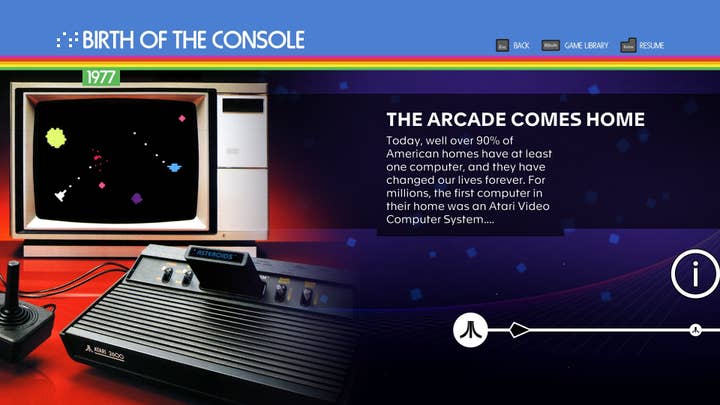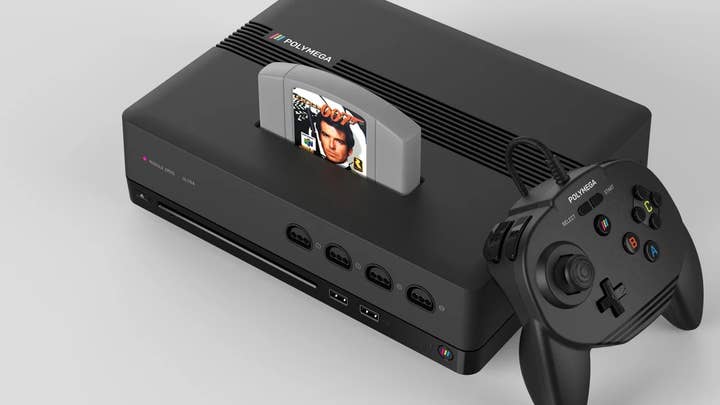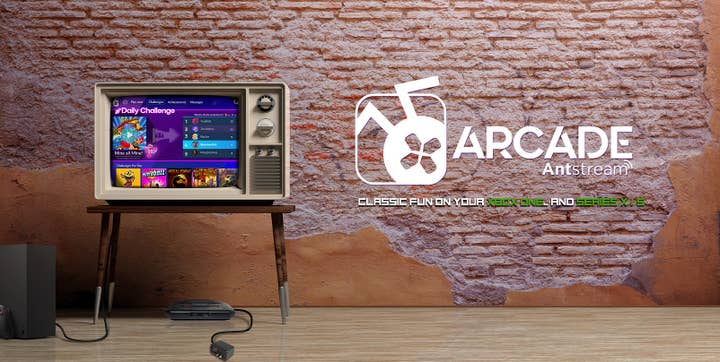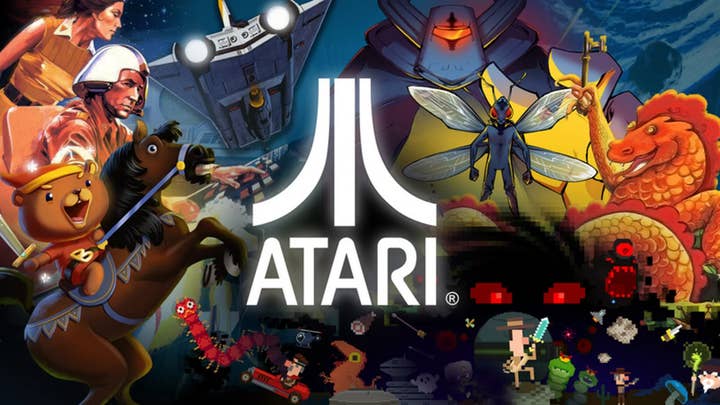Atari's re-focus on retro
CEO Wade Rosen explains how the company's recent investments and acquisitions fit into the bigger picture
Atari has been considered a retro brand for decades now, but it hasn't always leaned into that designation. While licensed T-shirts and plug-and-play consoles have been a fairly consistent offering, the company's growth plans focused less on its own games and more on branching out to wearables, movies, gambling, blockchain, and hotels.
That changed a couple years ago with the arrival of new CEO Wade Rosen. Since Rosen's appointment, Atari has continued trying to grow the business, but with acquisitions and investments that mostly had a very clear retro angle.
It acquired Digital Eclipse, developer of the Atari 50: The Anniversary Celebration collection, maybe the best-reviewed game with the Atari name attached since the company left the hardware business in the '90s.

It acquired Nightdive Studios, which built its name remastering older games for release on modern hardware, titles like Rise of the Triad: Ludicrous Edition, System Shock: Enhanced Edition, and Blood: Fresh Supply, which Atari published.
It invested Antstream Arcade, the retro subscription service that lets users stream a library of more than 1400 games from over a dozen platforms, including three Atari systems.
It also invested in Polymega, a modular retro console that lets users dump their old games and discs from a variety of classic systems and play them all on modern TVs with a slick user interface and quality of life features. When it invested in the company, it also announced an Atari module that would allow users to play and save Atari 2600 and Atari 7800 to the system.
Finally, it acquired a pair of websites in AtariAge and MobyGames. The former is a long-running and well-established community of Atari superfans, while the latter is the games industry's equivalent of IMDB, compiling developer credits for a huge swath of games.
Speaking with GamesIndustry.biz, Rosen explains the company's emphasis on retro endeavors.
"When we've gone outside of [retro projects], we haven't been as successful"
"I love retro, so it's easy to get passionate about it," he says, gesturing to a CRT TV in the background with an Atari 7800 hooked up to it. "For me it's been a passion of mine, so whenever a company can bring passion to something in addition to trying to execute on a high level, I think it's a disproportionate advantage for any company that can bring those together.
"As an organization when I came on board, the question was, 'What can we do better than anyone else in the world?' And we're not in a state to really compete with Microsoft or Sony or Nintendo, nor do we want to. So when we looked and asked what we could do better than anyone, retro was the thing that jumped out to us, at least at this stage in our history. So we just decided to be as great as we could at this very specific thing and that's what we've been focused on."
Beyond the company's acquisitions, it's also pushed the retro angle with its internal projects, like the just-launched Atari 2600+, an emulation-based system that plays original 2600 and 7800 cartridges. The company has also released new Atari 2600 games and Rosen says it will be making some new 7800 games as well.
"When we've gone outside of [retro projects], we haven't been as successful," Rosen says. "So we just keep testing the fringes to see what we can do and be successful at. But every time we stick to that and stick to what we're good at, it works. Atari 50 is another really good example of that."
As for the endeavors beyond retro, Rosen notes they have largely been limited to licensed efforts that don't demand as much of its internal resources. Internal gambling operations were shut down years ago, the hotel deal was always a license (though Rosen insists Atari has "a great licensee" for the project and he still hopes the project comes together), and the company has backed away from blockchain projects somewhat.
"The biggest issue I see with Web3 is there's just not a lot of clarity around it, and I think by now everyone thought there would be more clarity around how it could be used and there'd be more industry adoption and things like that," Rosen says. "For us, we've taken a less active approach in Web3 and instead of developing a lot of projects and being on the forefront and pushing that forward, we more work with partners we think are amazing partners and we work in a licensing capacity with those. For us it's more an extension of licensing. We still do that when it's appropriate and we feel strongly the partner is devoted to a good gaming experience, but it's not as big a part of our business as it used to be."
As for the acquisitions and investments, Rosen runs down what he saw in each one, starting with the pair of Digital Eclipse and Nightdive.

"I think both [Digital Eclipse and Night Dive] share the same DNA with Atari of focusing on a niche and trying to be really good at something rather than trying to be OK at a lot of different things," he says. "That made it easy. And the fact that niche was in the same space we really want to be good at – these two are arguably two of the best retro companies in the world – it made a lot of sense to bring those together. "
While there's an obvious opportunity for the pair to work on projects related to older Atari games, Rosen insists the company isn't mandating them to do any such thing, though it will be an option. More than that, he says there are opportunities for the pair to work together on projects, or refer potential projects to one another if the other's skillset is a better fit.
Beyond that, Rosen says one advantage the two will have as part of Atari is the ability to offload business logistics to their new parent.
"Running a company, there's a lot of time and energy that goes into doing things that aren't strategic," Rosen says. "Time you spend on IT, HR, finance, legal… it's massive. And it's not usually a strategic thing any of these companies like to do or have expertise in; it's pretty far from why they decided to create art in the first place. So the first thing we do is take those things off their plate so they can focus on what they really love."
Atari's other two acquisitions – MobyGames and AtariAge – are a less obvious strategic opportunity for the company.
"AtariAge is a really passionate community that for a long time, I don't feel we as Atari did a strong enough job recognizing, engaging with, or being a part of"
AtariAge is clearly retro and right up Atari's ally, but it's not every day we see companies buying up independent fan communities.
"AtariAge is a really passionate community that for a long time, I don't feel we as Atari did a strong enough job recognizing, engaging with, or being a part of," Rosen said. "So a lot of times it created this feeling that there's AtariAge doing things that are based in love of the brand, and then there's what Atari is doing, which was radically different."
Rosen says the company wanted to end that dichotomy, adding that AtariAge comprises some of the most devoted Atari fans on the planet, and it made no sense to have the distance that existed between the community and the company.
"The second and more practical piece is with us going back and trying to make retro more accessible with the 2600+, the module that will be coming out next year for Polymega, and other projects we have in the works, we needed to be in touch with the community that's still supporting those ecosystems," Rosen says.
Atari still considers those platforms to be living ecosystems, he says, and buying AtariAge seemed like the best way to foster those ecosystems since those fans have already been supporting them.
He's notably cagier when it comes to MobyGames.
"I can't share too much on Moby right now," Rosen says. "There will be more in the coming year on our plans for Moby, but I think it also has a strong community. It's not just retro focused, it's more of a larger video game community but certainly there's a retro [angle] on that. And I'd love to find more ways to tie it into what we're doing holistically at Atari. More to come on that one; I'm always careful not to over-promise and under-deliver."
That's a good transition to talk about the investment in Polymega, a company that has had chronic problems with under-delivering to the point that customers have been waiting multiple years for their orders on the system to be filled, while announced add-ons like a module to play N64 games (announced in 2021) and a light gun that works with HDTVs (announced in 2019) still haven't shipped. A digital storefront for old games, a streamlined version of the console called the Polymega Remix, and a Polymega app have also been announced but not yet materialized.

So if the track record on follow-through is that checkered, what attracted Atari to the retro console maker?
"I think that company has just done really innovative things," Rosen says. "It was one of those situations where we looked at what had been done and we asked, 'Could we do something better?' That's usually the question I ask if we're considering an investment, an internal gut check to say, could we do this better? Would we do this differently? And we looked at Polymega and just said 'no.' I don't think we could make a better product. I don't really know what could be done to make it better except for small, incremental improvements."
The investment was also part of a larger deal that involved getting an Atari module added to the system, as well as adding Polymega Remix functionality to the Atari VCS microconsole and unspecified other ways of bringing Atari content to the platform.
While Rosen is clearly impressed by the product Polymega has put out, he acknowledges its difficulties in fulfilling orders and meeting its own release schedule gave Atari pause.
"That was a really big hurdle to overcome," Rosen says. "The old adage that hardware is hard is very true. For most of our projects we've done and probably the ones we will do going forward, we look for best-in-class partners who know how to do those things, have access to supply chains and distribution chains… In the case of the Polymega, the investment really was for them to clear that up. The investment was really to help them get back on track on those things and work out from that backlog.
"Antstream has probably been the most successful application for the VCS"
"COVID was a very difficult time for hardware companies because it upended the assumption that almost all hardware companies had made prior to that, which is that everything in the cost of inputs will go down. You spec something and your most expensive year is going to be your first year and your least expensive year is going to be your last year. Then COVID came around and flipped it upside-down."
Finally, there was the investment in Antstream.
"Antstream has been a pioneer in the retro space for the past few years so that seemed like a very natural fit," Rosen says. "And they were open to selling us MobyGames, and that was part of a larger decision around the acquisition of MobyGames and also to support a partner in the retro space that has a lot of Atari content on the platform.
"Antstream has probably been the most successful application for the VCS. And I think for Antstream, [VCS players] are probably the most dedicated players they have with the highest retention. I know that's how I still play and engage with Antstream."

When one company acquires another, we don't normally ask, "What if everything goes south." But the acquisitions of AtariAge and MobyGames are a bit different because they're not one game maker buying another.
In one case, Atari bought a long-standing community that for years proved a better steward of Atari's legacy than Atari itself. In the other, it bought a widely used reference documenting a significant cross-section of gaming's history.
Having just watched another publisher follow up its public embrace of gaming history by closing historically significant developers like Volition and Free Radical after buying them in a spate of acquisitions, we ask Rosen about whether he recognizes the responsibility people will expect of him to safeguard these institutions' future even if Atari's future doesn't go as planned.
"Do I recognize the responsibility? Absolutely," Rosen says. "Do we try when we make an acquisition to think about worst-case scenarios if there were issues? We do, and we try to work through all those things.
"At the same time, you mention Embracer. There's a part of me that empathizes with Embracer. They're coming under a lot of fire right now for having to shut down those studios, and Embracer… Maybe they leaned into it a little bit more than most companies, but most video game companies accelerated heavily during COVID. The acceleration in investment was just massive, and that was a decision a lot of teams made.
"The difference is most companies now… some are shutting down studios but a lot of times they're laying off people internally. And that's painful, but it doesn't get as many headlines as a shutdown. I'm sure if you asked them at the time, they probably ran a worst-case scenario and the state they're looking at right now probably wasn't on there."
"Regardless of what happens to Atari, I would love to see something like MobyGames continue to survive"
Rosen believes the company has plans for taking care of MobyGames and AtariAge if the company's projected worst-case scenario comes to pass, but acknowledges that there are problems that wouldn't be anticipated even by those scenarios.
"Regardless of what happens to Atari, I would love to see something like MobyGames continue to survive," he says. "I think MobyGames is something that is massive for the industry and needs to stand on its own.
"I can see AtariAge surviving. It's a little bit more complicated with that because it really is a direct line to Atari. My hope there is those don't separate going forward, but in the same way that AtariAge wouldn't die, I have a hard time seeing Atari die.
"For a while it almost became a joke in the industry how many iterations it had gone through, but it's also a testament to its staying power as a company and a brand. And as long as Atari exists, I have a hard time imagining AtariAge won't exist. As MobyGames goes, as long as the video game industry exists, it would be hard for me to see a place where Moby doesn't exist."
Rosen has been at the helm of Atari for coming up on three years now, and he says the jokes about the company and the negative perceptions around it still come up, but not as often. And the only way he can think of to make it go away entirely is by the company doing what it says it will do.
"What I would ask is for people to judge us based on whether we're doing what we say we're going to do and hold us to those actions," Rosen says. "And I think it's totally reasonable for people to have a healthy level of skepticism whether we're different or not. But I would ask on the other side of that for them to be open to seeing a different Atari and recognizing it."

